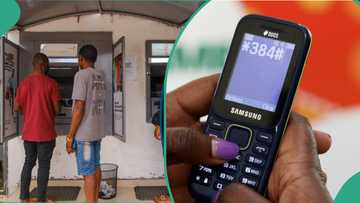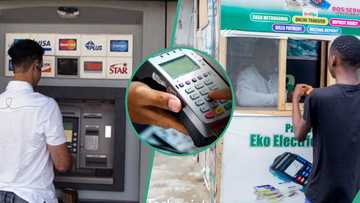CBN Canvasses More Digital Payment as Electronic Transfers Increase to N566.39 Trillion
- Nigeria's use of digital payments is demonstrated by N566.39 trillion sent and received electronically between January and July
- In July, the largest monthly total—N89.5 trillion—was recorded, signifying an 89% rise from the previous year
- Through the promotion of digital payment methods, the Central Bank of Nigeria has aided in the growth of mobile transactions
Legit.ng journalist Zainab Iwayemi has 5-year-experience covering the Economy, Technology, and Capital Market.
Nigeria's usage of digital payments has significantly increased, as seen by the cumulative N566.39 trillion in electronic transfers that occurred between January and July.

Source: Getty Images
The biggest monthly total, N89.5 trillion, was reported in July, representing an 89% year-over-year increase. As more Nigerians use digital platforms for their financial requirements, this trend mirrors a larger trend towards cashless transactions.
Through a number of important causes, mobile reach has had a major impact on the expansion of electronic transfers in Nigeria.
Leadership reported that mobile money transfers increased by 74% to N41.5 trillion in early 2024 due to the greater access to mobile banking apps made possible by the rise in smartphone ownership, which is expected to reach 60% by 2025.

Read also
Relief for customers as MTN, Glo, and 9mobile will no longer disconnect 9 banks’ USSD codes today
Furthermore, mobile technology has improved account ownership and utilization through mobile payments, opening up financial services to a wider audience, especially those who lack bank accounts.
A trend towards digital payments is being driven by consumers' preference for mobile transfers over traditional banking methods due to their speed and ease.
Additionally, the Central Bank of Nigeria has encouraged the adoption of mobile transactions by promoting digital payment options.
Legit.ng reported that a recent finding on electronic transfer levy has shown that microtransactions drive Nigeria's e-payment boom, underscoring the growing use of digital channels in daily life. Microtransactions are typically transactions valued at less than N10,000.
BusinessDay reported that the failed attempt at a cashless policy by then CBN governor Godwin Emefiele brought attention to these microtransactions.
Several people switched to digital channels when physical naira became scarce by January 2023. At the time, cashless transactions amounted to N39.58 trillion, up by 45.41% year over year, according to data from the Nigeria Inter-Bank Settlement System (NIBSS).
Accounts exempted from FG’s electronic money transfer levy
Legit.ng had reported that Nigerians have reacted to the commencement of the N50 Electronic Money Transfer Levy (EMTL) on transactions in financial technology companies such as Opay, Palmpay, Moniepoint, and others.
The fintech firms notified users on Sunday, December 1, 2024, that the charges would commence on Monday, December 2, 2024. Legit.ng earlier reported that the companies had scheduled to begin the new charges on September 9, 2024, but was delayed due to outcry among Nigerians.
According to company messages, the EMTL is a one-off N50 charged on every transaction from N10,000 and above. The EMTL was ordered by the Federal Inland Revenue Service (FIRS) on behalf of the Nigerian government and aligns with the 2020 Finance Act.
PAY ATTENTION: Сheck out news that is picked exactly for YOU ➡️ find the “Recommended for you” block on the home page and enjoy!
Source: Legit.ng



